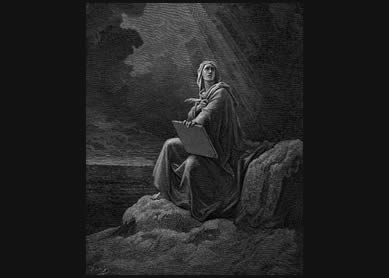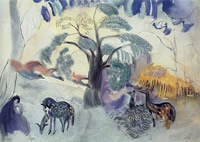When John Milton wrote Paradise Lost, he was, like many in seventeenth-century Britain, caught between his commitments to humanist reason and to Christianity. He also struggled in his relationships with women and thought that he was unable to find his intellectual equal. This perspective shaped Milton’s famous portrayal of Eve in Paradise Lost. Though Milton’s Eve is very different from the Eve found in the biblical book of Genesis, Milton’s poem has for centuries greatly influenced perceptions of Eve.
How does Milton portray Eve?
He in delight
Both of her beauty and submissive charms
Smiled with superior love… (4.497-498)
Milton repeatedly characterizes Eve in terms of her physical beauty and her inferiority to Adam. Adam is the image of God; Eve is the image of Adam (4.299).
Milton’s Eve has “golden tresses wore / Dishevelled, but in wanton ringlets waved / As the vine curls her tendrils, which implied / Subjection…” (4.305-308). Someone from Britain might idealize a blond beauty, but his assumption that her subjection is justified by her curly hair seems arbitrary and prejudicial.
At the climax of Milton’s story, Eve considers concealing the fruit she has taken from the forbidden tree so that she can be superior to Adam, but she changes her mind because she might actually die, leaving Adam free to marry another (9.816-832). Adam, however, chooses to eat the fruit because he cannot imagine life without Eve (9.908-916). In the Bible, the woman eats because the fruit looks edible and could make her wise, and the man apparently eats because the woman handed it to him as he stood next to her listening to the serpent (
Milton’s portrayal of Eve is pervasive in Western culture. Influenced by attitudes of his time, Milton perpetuates the idea that Eve alone chose to sin for selfish reasons. Eve’s worth is in her beauty, though Milton does allow her high-order reasoning (see her discussions with Adam and Satan in Book 9). Unfortunately, like Satan, she uses her power for her own gain. While it is true that Milton builds on long-held conceptions of Eve (found in early stages in





